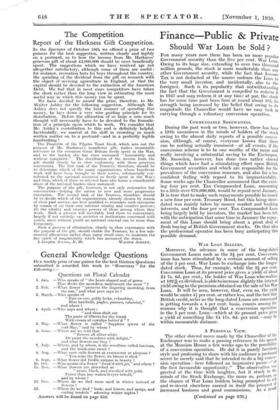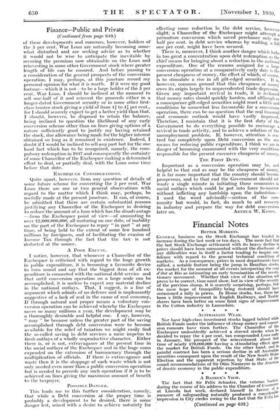Finance—Public & Private
Should War Loan be Sold ?
FOR many years now there has been no more popular Government security than the five per cent. War Loan, Owing to its huge size, extending to over two thousand million pounds, the stock is more marketable than any other Government security, while the fact that Income Tax is not deducted at the source endears the Loan to the very small investor, and incidentally, also to the foreigner. Such is its popularity that notwithstanding the fact that the Government is compelled to redeem it in 1947 and may redeem it at any time at par, the stock has for some time past been firm at round about 105, its strength being increased by the belief that owing to its magnitude the Chancellor would have no easy task in carrying through a voluntary conversion operation.
COMMENDABLE SHREWDNESS.
During the past week or two, however, there has been a little uneasiness in the minds of holders of the stock owing to the almost daily reports of a possible conver- sion, although, of course, everyone knows that there can be nothing actually imminent—at all events, if the conversion scheme is to be one worthy of the name and really involving a substantial saving to the Exchequer. Mr. Snowden, however, has done two rather shrewd things which have had a stimulating effect upon British Government securities and which are responsible for the prevalence of the conversion rumours, and also for a less confident feeling with regard to its impracticability, Some weeks ago the Chancellor announced that the exist- ing four per cent. Tax Compounded Loan, amounting to a little over £70,000,000, would be repaid next January. It is true that to make such repayments possible he issued a new four per cent. Treasury Bond, but this being short- dated was mainly taken by money market and banking interests, and the four per cent. Tax Compounded Loan being largely held by investors, the market has been left with the anticipation that some time in January the repay- ment of this Loan should bring about a great deal of fresh buying of British Government stocks. On that idea the professional operator has been busy anticipating this possible demand.
WAR LOAN SELLERS.
Moreover, the advance in some of the long-dated Government Loans such as the 31 per cent. Conversion issue has been stimulated by a certain amount of selling of the 5 per cent. War Loan to exchange into the longer• dated stock. Thus, for example, while the 8j per cent. Conversion Loan at its present price gives a yield of about £4 7s. 6d. per cent., the holder of War Loan who realizes at 102* ex dividend, is able to increase slightly the interest yield owing to the premium obtained on the sale of his War Loan. It will be seen, however, that, even so, the yield would be under 41 per cent. or rather less, and the fact that British credit, so far as the long-dated Loans are concerned is getting towards a 4 per cent. basis, counts among the reasons why it is thought that a conversion operation in the 5 per cent. Loan—which at its present price gives a yield of something like £4 17s. 6d. per cent.—may be within measurable distance.
A PERSONAL VIEW.
The other shrewd move made by the Chancellor of the Exchequer was to make a passing reference in his smell at the Mansion House a few weeks ago to the possibikty of a conversion operation. He did it in purely facetious style and professing to share with his audience a profound secret he merely said that he intended to do a big conver- sion operation—here followed an impressive pause—"at the first favourable opportunity." The observation was greeted at the time with laughter, but it stuck in the
minds of the Stock Exchange, the more so, perhaps, ss” the chance of War Loan holders being prompted to sell and re-invest elsewhere carried in itself the prospect of increased business and good commissions. As a result
(Continued on page 652.) Finance—Public and Private (Continued from page 649.) of these developments and rumours, however, holders of the 5 per cent. War Loan are naturally becoming some- what disturbed and are seeking advice as to whether it would not be wise to anticipate the inevitable by securing the premium now obtainable on the Loan and reinvesting in some other Government stock where greater length of life can be ensured. And before passing to a consideration of the general prospects of the conversion operation, I may, perhaps, at this juncture record my personal opinion for what it is worth. If it were my good fortune—which it is not—to be a large holder of the 5 per cent. War Loan, I should be inclined at the moment to sell one-half of it and reinvest the proceeds either in a longer-dated Government security or in some other first- class trustee stock giving a yield of from 4.1 to Vs per cent., for I should scarcely expect to get a better yield than that. I should, however, be disposed to retain the balance, being inclined to question the likelihood of any early conversion scheme other than on lines giving options of a nature sufficiently good to justify my having retained the stock, due allowance being made for the higher interest obtained so long as it remained in existence. Indeed, I doubt if I would be inclined to sell any part but for the one hard fact which has to be recognized, namely, the com- pulsory redemption in 1947 and consequently the certainty of sonic Chancellor of the Exchequer making a determined effort to deal, or partially deal, with the Loan some time before that date.
EXCHEQUER CONSIDERATIONS.
Quite apart, however, from any question of details of some future scheme for converting the 5 per cent. War Loan there are one or two general observations with regard to the matter which I think may, perhaps, be usefully made at the present juncture. It can, of course, be admitted that there arc certain substantial reasons justifying any Chancellor of the Exchequer in desiring to reduce the amount of a loan which has the disadvantage —from the Exchequer point of view—of amounting to over £2,000,000,000, all maturing on one (trite, of inability on the part of the Exchequer to repay " in part " at any time, of being held to the extent of some few hundred millions by foreigners, and of facilitating the evasion of Income Tax through the fact that the tax is not deducted at the source.
A POOR EXCUSE.
I notice, however, that whenever a Chancellor of the Exchequer is criticized with regard to the huge growth in public expenditure, it is becoming a favourite device to turn round and say that the biggest item of all ex- penditure is connected with the national debt service and that until conversion operation on a large scale can be accomplished, it is useless to expect any material decline in the national outlays. That, I suggest; is a line of argument which admits of no defence and is unpleasantly suggestive of a lack of zeal in the cause of real economy; If through natural and proper means a voluntary con- version operation can be achieved whereby the Exchequer saves so many millions a year, the development may be a thoroughly desirable and helpful one. I say, however, " may " be because unless the greater part of the saving accomplished through debt conversion were to become available for the relief of taxation we might easily find the so-called saving in debt services a mere impetus to fresh outlays of a wholly unproductive character. Either there is, or is not, extravagance at the present time in the social outlays of the Exchequer and in the huge sums expended on the extension of bureaucracy' through the multiplication of officials. If there is extravagance and waste then it is the stoppage of such waste which is not only needed even more than a public conversion operation but is needed to precede any such operation if it is to be achieved on lines giving the maximum amount of benefit to the taxpayer.
POSSIBLE DANCER.
This leads me to this further consideration, namely, that while a Debt conversion at -the proper_ time is probably a development to be desired, there is some-
danger lest, seized with a desire to achieve notoriety for . .
effecting sonic reduction in the debt service, however slight; 'aChancellor 'of the -Exchequer might attempt a premature conversion which saved perchance only one half per cent in debt service whereas by waiting, *a fun one per cent. might have been secured. There is, moreover, I think another danger which lurks in too great a concentration upon debt redemption as the chief means for bringing about a reduction in the national expenditure. One of the reasons assigned for a lame conversion operation at a comparatively early date is the present cheapness of money, the effect of which, of coutse is to stimulate rise in all gilt-edged securities. It is: however, common ground that this cheapness of money owes its origin largely to unprecedented trade depression. Given any important revival in trade, it is reckoned that money rates should quickly harden, and although as a consequence gilt-edged securities might react a little and conditions be somewhat less faVoumble for a conversion operation, there can be no question that the real financial and economic outlook would have vastly improved. Therefore, I maintain that it is the first duty of the Government to do everything possible to encourage a revival in trade activity, and to achieve a solution of the unemployment problem. If, however, attention is cen- tred too completely upon Debt conversion as the one means for reducing public expenditure, I think we are in danger of becoming enamoured with the very conditions responsible for the present excessive cheapness of money.
TILE FIRST DUTY.
Important as a conversion operation may be, and helpful to that end as may be the cheapness of money, it is far more important that the country should become prosperous, and to that end the Government should not waste a single minute in initiating those economies in social outlays which could be put into force to-morrow without inflicting any hardship upon the industrious— I used the word advisedly—section of the can munity but would, in fact, do much to aid recovery in industry and prepare the way for debt conversions











































 Previous page
Previous page